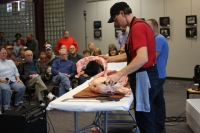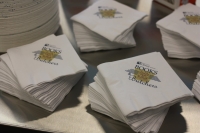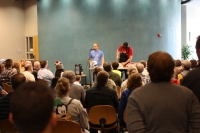Books and Butchers
Johnson County Library, Kan.
Innovation Synopsis
Books and Butchers was a program in which two butchers demonstrated their knowledge by breaking down a half pig. During this presentation the crowd asked questions and conversed with the butchers. Librarians created displays of relevant materials and referred patrons to parts of the collection that further discussed their interests.
Challenge/Opportunity
Books and Butchers was intended to meet several challenges: to support, encourage, and promote local businesses; to provide an educational and engaging program for library patrons; and to expand the ideological margins of library programming with a surprising premise for a public library program. The butchers were both from The Local Pig, a local butcher shop that uses only livestock sourced from the Kansas City area. In turn, they provide meat for many local restaurants, allowing food to flow from farm to table along a completely local path. By highlighting this network of producers in our library, our goal was to showcase the local businesses that often get lost in the shadow of larger entities. The nature of these businesses illustrated why it was important that people consumed their food in a sustainable way. In terms of structure, the program was approximately two hours of demonstration with simultaneous audience interaction. During the course of the program, the presenters made reference to issues as widely ranging as sustainable agriculture, business strategy, marketing, and even discussed some relevant fiction titles. Thanks to careful planning, staff members had included these topics in nearby displays and were able to guide patrons to appropriate materials. At the end of the session, audience members left with a deeper understanding of how local businesses were working together towards the goal of sustainability.
Key Elements of Innovation
Of course, we could have put on a program on local business and sustainable farming without the spectacle of a hog butchering. But by performing an actual butchering in the library, we challenged the stereotype of typical library programming. We demonstrated that programs can be exciting, daring, and maybe even a little bit gross, all while falling well within our mission as an educational institution. It pushed the boundaries of expectation, and it broadened our patrons’ ideas of just what exactly might happen at their local public library. And needless to say, telling people of our plan to butcher a hog in the library generated quite a bit of buzz. It was not a hard sell for a large segment of our patrons, and once we had their attention we found them eager to listen to the larger idea of the program. By providing an experience that generated curiosity, it gave patrons a reason to delve further into topics of which they may not have even been aware. The format of Books and Butchers also challenged the traditional programming practice. By bringing in subject experts who were not authors, we went a step beyond normal library programming by directly connecting library users with the topic that they came to the library to learn about, as opposed to using an author as a sort of translator between subject matter and audience. In short, we felt that the vivid image of butchers demonstrating their trade in the library was profoundly helpful in attracting attention to the program. Deploying a premise that was so unexpected and surprising gave us an immediate advantage in furthering the program’s goals.
Achieved Outcomes
The overarching intended outcome of Books and Butchers was to give a platform to a local business to discuss the reasons why they consider sustainability, both ecological and commercial, to be crucial. This outcome was roundly achieved. Audience members participated in what became essentially an open forum on a multitude of topics that were related to the central premise in a variety of ways. Beyond those immediate outcomes, we successfully expanded our patrons’ conception of what is possible in their library. Because the program was so well attended and the feedback so positive, it could be said we received a mandate to try other experimental programs in the future. In other words, we added a new arrow to our quiver. In addition to the achieved outcomes discussed above, Books and Butchers won a tremendous amount of publicity for the library. The program was discussed the local and regional newspapers, and was also written up on the front page of the Wall Street Journal (1/8/13) as part of a larger article on innovative library programming. From there, it was picked up by The Atlantic Wire. We learned from this program that our patrons have a high tolerance for risk and experimentation, which is important because it allows us to think more freely with regards to library service than perhaps we have in the past. In sum, it not only met the goal of any program, which is patron edification, but pushed the boundaries of what exactly is possible with programming.



